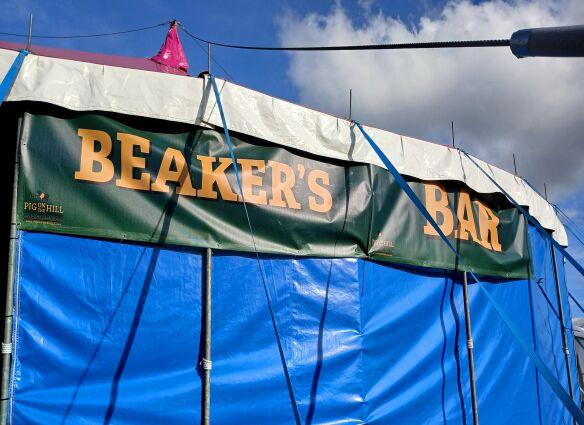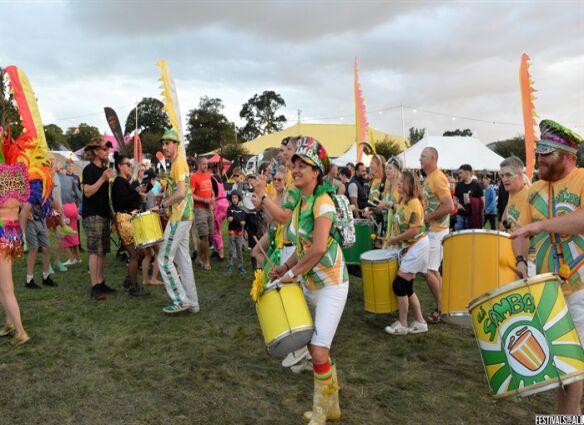Social Links
| Standon Calling 2012 | ||
|
2nd - 4th Aug 2012 Standon Lordship, Standon, Hertfordshire, SG11 1PR, United Kingdom |
Tickets from £0.00 |
|
Reaching over his left shoulder, Melvin Benn unscrews the light bulb and begins bashing it against the table in front of him.
Source: By Simon Atkinson Business reporter, BBC News 14th June 2010
"They're so robust, it's hard to believe," he says, between some fairly hefty thwacks. "They're phenomenal."
The echo of the bulb bounces round the walls of the office, which are covered in music memorabilia including dozens of posters from events such as the Reading and Leeds festivals, Creamfields and Latitude.
It is the home of Festival Republic - the company Mr Benn heads and which runs all these events and several more.
But while clearly an enthusiastic fan of the long-lasting, low-wattage, low-emission light bulb - you will not find them being used at his festivals anytime soon.
Melvin Benn Festival Republic "It no longer just makes environmental sense, it makes economic sense as well”
"They're perfect for a rough and tumble environment but they're incredibly expensive - something like £60 per light bulb, so economically it's not quite there yet," Mr Benn says.
"When you need 10,000 light bulbs at a festival around the campsites, £60 a bulb doesn't do it."
'Tent culture'
It would be an exaggeration to say that music festival promoters are now as focused on environmental responsibility as they are on securing the kind of headline acts that are guaranteed to sell tickets.
But reducing the environmental impact of UK festivals is increasingly on the agenda - despite financial stumbling blocks.
The "outdoor, makeshift, tent culture" means festivals have a long history of trying to address environmental issues, says Alison Tickell, director of Julie's Bicycle, a non-profit group that advises the music industry on all things green.
Many events have smatterings of visible initiatives from solar panels which heat showers to wind powered mobile phone recharging.
GREEN FESTIVAL-GOING TIPS Source: A Greener Festival
- Try to travel by coach or train and use festival shuttle buses. If you take a car then lift-share
- Take as little as possible with you - and do not leave things behind when you depart
- Bring a reusable water bottle you can refill on site. It saves money and reduces the amount of waste
- Separate your rubbish into recyclable and non-recyclable and leave it in designated areas
At Mr Benn's Latitude, for example, punters pay a £2 deposit for a sturdy souvenir cups at on-site bars - providing something more substantial to drink from, reducing the number of cups thrown away and offering a nice festival keepsake.
Meanwhile, environmental charities such as Friends of the Earth and Greenpeace attend several events to educate, campaign and raise funds - often at a time when, they say, people are relaxed, away from an urban environment and more receptive to new information and ideas.
Travel side-effect
A report earlier this year suggested that the UK's music industry was responsible for about 540,000 tonnes of carbon dioxide emissions, also known as greenhouse gases.
And much of it came from the festival side of the business.
But by far the most damaging activity in terms of carbon emissions is simply people travelling to and from events.
With UK festivals set to attract more than one million visitors this year, people's journeys - be it by car or train, bus or plane - make up about two-thirds of the greenhouse gas output linked to the UK festival scene, according to Julie's Bicycle.
And this issue of audience travel is "one of the hardest areas to address because it is outside the festival operator's immediate control", says Ms Tickell.
Most festivals are held on greenfield sites, meaning they do not lie conveniently on public transport routes.
Promoters often use incentives to encourage audiences to think carefully about how they travel. But some, such as running free or subsidised shuttle buses from train stations - have a cost.
Measuring impact
Last week ten big-name festivals - including the Big Chill, and Lovebox - pledged to cut 10% of their emissions during 2010.
And Mr Benn believes that improving environmental performance "no longer just makes environmental sense, it makes economic sense as well".
The rising cost of sending waste to landfill (the tax alone is £40 a tonne, set to increase to £72 by 2013) is just one factor organisers are all too well aware of.
Therefore reducing waste and increasing recycling is important to a festival's financial as well as environmental sustainability, says Claire O'Neill of A Greener Festival - which accredits festivals based on their environmental performance.
She says UK events such as Bestival are taking inspiration from a scheme launched at the Vuuv festival in Germany - which charges every attendee five euros and gives them a bag to fill with either waste or recyclables. The money is returned when they bring back a full bag.
"Incentivising your audience and involving them in clearing up and recycling helps reduce waste" Ms O'Neill says. "And you also encourage people to think about waste separation, and hopefully that's something that they take back home with them."
While admiring such initiatives, Ms Tickell of Julie's Bicycle argues that the best thing event organisers can do is to try to measure their energy impact.
Such a "volatile" environment as a temporary site in a field makes this tricky, she acknowledges, but is heartened that more festivals are doing it.
"People are starting to measure their energy profiles - not for the audience, not for the artists but in order to commit to reducing it," she says.
"It sounds boring, but this is very much the first stage towards making a seismic cultural shift."
Local support
Going carbon-neutral is an ambition of Benedict Addis - the sustainability manager at Standon Calling - a festival for about 4,000 people set in the idyllic grounds of a Hertfordshire manor house.
However, Mr Addis admits it would be cheaper to use so-called red diesel, which is designated for use in things such as tractors, boats and generators - and is sold at a preferential tax rate.
"We're only able to afford bio-diesel thanks to the support of our local supplier and even then we pay a premium for it," he says.
"But it's a big step forward in becoming carbon neutral."
Unexpected benefit
However, not all its green initiatives cost the festival money.
An on-site bore hole has been used to plumb in glass-washing machines. Rather than handing out disposable plastic glasses, its bars now serve drinks in tough, reusable, polycarbon glasses.
"Last year we only used about 2,000 glasses for a festival of 4,000 people," Mr Addis says.
"Before we did this we were getting through something like 20,000 disposable ones."
And because the glasses now used are considerably more expensive to buy, drinkers pay a 50 pence returnable deposit.
"But a lot of people, especially after they've had a few pints, don't bring them back," Mr Addis says.
"So that unclaimed deposit money pretty much covers the cost of the plumbing."
'Prettiest girls'
Another money-saver has been forcing on-site traders to serve food and drinks with plates, cups and cutlery made from corn starch.
Along with food waste - these are taken to a local farmer for composting. Within two months the compost is used on the land where the festival is held, and sold to other farmers to cover costs.
But not all issues require such complicated approaches.
A common problem at UK festivals is tents, camping chairs and barbecues being abandoned at the end of a festival by people too partied-out (or, possibly just lazy) to pack away what are increasingly seen as disposable items.
However, Mr Addis says he has hit on a novel approach.
"On the final day of the festival it's not unknown to ask the prettiest girls working in the rubbish collection team to go around the campsite, encouraging people to take everything home with them," Mr Addis laughs.

"And this will often do the trick."











